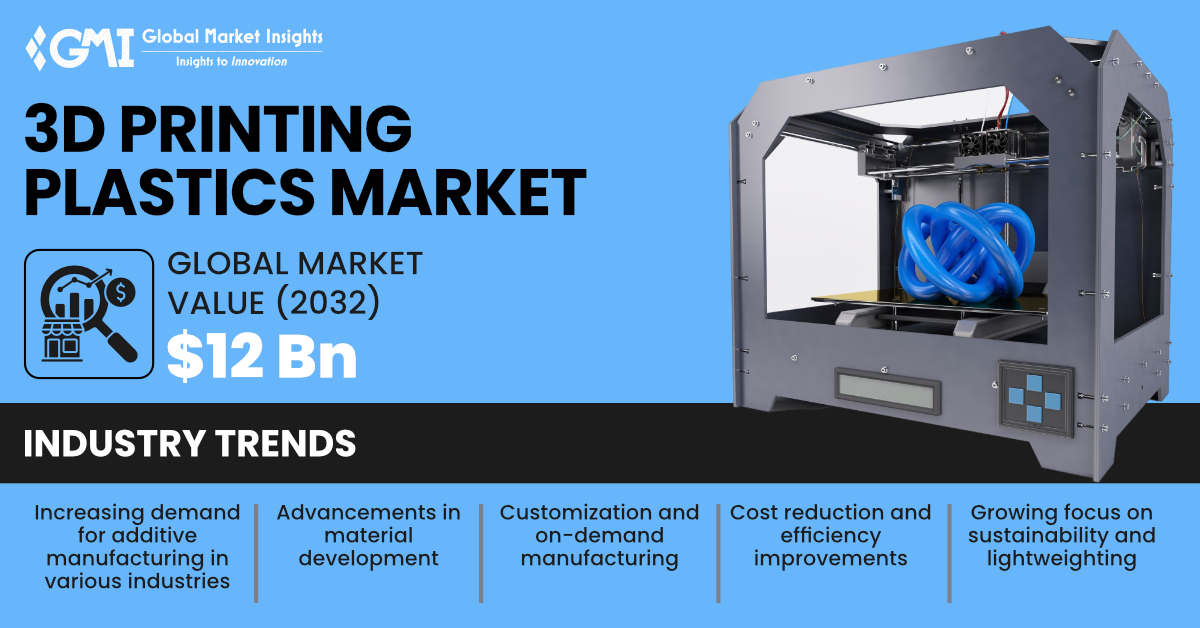Selbyville, Delaware, July 01, 2024 (GLOBE NEWSWIRE) -- 3D Printing Plastics Market is projected to worth USD 12 billion by 2032, as per a recent study by Global Market Insights Inc.
With increasing awareness of environmental issues, the demand for sustainable building practices is witnessing an uptick. 3D printing of plastics offers opportunities for sustainable manufacturing, as it can reduce waste compared to traditional manufacturing methods. Furthermore, advances in bio-based recycled plastics further contribute to the sustainability of 3D printing plastics.
Request for a sample of this research report @ https://www.gminsights.com/request-sample/detail/8432

Against this backdrop, in February 2024, VOiLA3D, a deep tech company specializing in large-scale robotic 3D printing, partnered with an IISc (Indian Institute of Science) research team to address challenges in 3D printing with recycled plastic. Their collaboration focuses on an upcycling technique developed by IISc researchers, which aims to transform littered plastic into consumer products like furniture. This innovative process not only supports sustainable practices but also enhances the efficiency and effectiveness of using recycled plastic in 3D printing technology.
As the cost of 3D printing equipment decreases and printing speed increases, the technology becomes more accessible and cost-effective for the 3D printing plastics market. This is amplifying the 3D printed plastics demand as a viable option as are alternatives to traditional methods. 3D printing makes it easier to create and customize custom products, which are especially valuable in industries such as healthcare, automotive, and consumer goods. Plastic is a versatile material that can be used to create a wide variety of customized objects, leading to a high demand for 3D printing plastics.
Popularity of PolyJet Technology on the rise
The 3D printing plastics market share from the polyjet technology segment will exhibit noteworthy expansion through 2032, owing to the versatility and accuracy of polyjet technology. PolyJet printers use a photopolymer resin that cures after layers, creating striking effects and fine details. This process yields a wide range of materials with different qualities, from hard to soft, from transparent to opaque. These multipurpose products serve the needs of industries such as healthcare, automotive, and consumer goods, where customized and high-quality products are in high demand. Furthermore, the additive manufacturing process reduces waste and speeds prototyping, leading to innovation and efficacy in manufacturing.
Automotive segment to garner appreciable gains
The 3D printing plastics industry from the automotive segment will record a sizeable valuation by 2032. Technology permits the manufacturing of lightweight yet robust parts, improving fuel efficiency and overall performance. 3D printing enables rapid prototyping and personalization, stimulating the advancement of complex geometries and limiting time-to-market. Furthermore, the capacity to create on-demand spare parts curbs inventory prices and simplifies the distribution network essential in the fast-paced automotive industry. With innovations in materials and printing technologies, the automotive sector progressively relies on 3D printing plastics to cater to shifting consumer needs and regulatory standards.
Make an inquiry for purchasing this report @ https://www.gminsights.com/inquiry-before-buying/8432
Asia Pacific to maintain its dominance
Asia Pacific 3D printing plastics market will depict a noteworthy CAGR over 2024-2032. Asia Pacific’s proliferating production industry, associated with technological innovations, ushered in the adoption of 3D printing for rapid prototyping and production. The strengthening awareness of sustainability and environmental issues has led industries to explore sustainable materials such as biodegradable 3D printing plastics. The personalization abilities offered by 3D printing serve the diverse consumer demands in the healthcare, automotive, and consumer goods sectors. This merger of technological development, ecological consciousness, and demands thrives the 3D printing plastics industry in Asia Pacific.
3D Printing Plastics Market Players
Major 3D printing plastics vendors include Evonik, BASF, Leapfrog, 3D Universal, 3D Systems, Inc, Arcam, Materialise NV, Arkema, Imagin Plastics Ltd., Stratasys, ExOne GmbH, and Push Plastic, among others.
Key 3D printing plastic manufacturers are strengthening their presence by investing heavily in R&D to advance printing technologies. They are expanding their market share through alliances and acquisitions, expanding their product line and global footprint. These 3D printing plastics producers lead in advancement by offering exhaustive solutions integrating advanced materials, software, and printing technologies, strengthening their position as market leaders. They engage closely with industry leaders to comprehend shifting demands, providing customized solutions and support services.
In February 2024, Evonik entered a joint venture with Jland Biotech. The partnership allows Evonik to present commercial quantities of collagen for usage in skincare products.
In February 2024, BASF Coatings signed a collaborative agreement with INEOS Automotive for its global body and paint program.
About Global Market Insights
Global Market Insights Inc., headquartered in Delaware, U.S., is a global market research and consulting service provider, offering syndicated and custom research reports along with growth consulting services. Our business intelligence and industry research reports offer clients with penetrative insights and actionable market data specially designed and presented to aid strategic decision making. These exhaustive reports are designed via a proprietary research methodology and are available for key industries such as chemicals, advanced materials, technology, renewable energy, and biotechnology.
